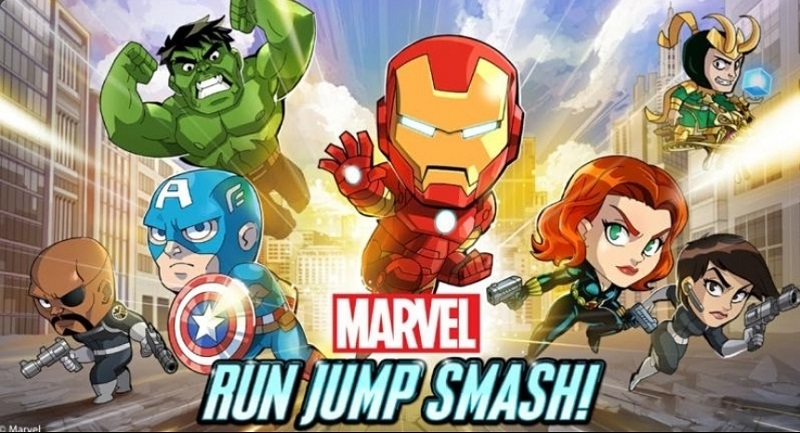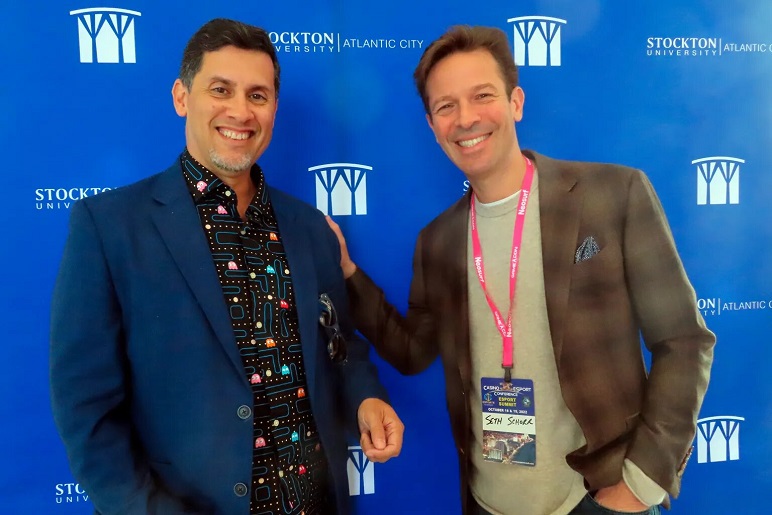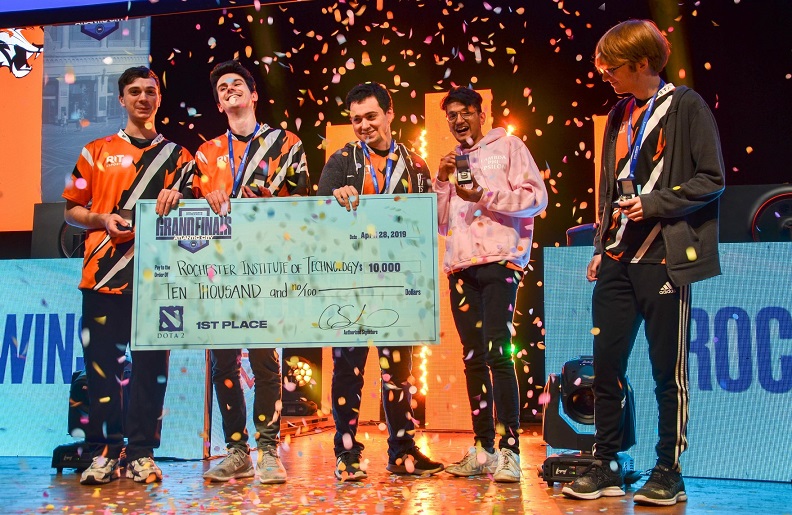“I have held lead creative roles on interactive projects such as Batman, The Transformers, Star Wars, Marvel” — Interview with CEO of the Gaud-Hammer Gaming Group Anthony Gaud

We continue our series of interviews with prominent figures in the world of gambling, and our guest today is Anthony Gaud, the CEO of the G3 Gaud-Hammer Gaming Group.
We’ll learn about Anthony Gaud’s career transition to iGaming, from a career of developing video games and original Emmy-winning shows for Disney, Discovery and Nickelodeon. We will also discover how to adapt video games for real-money wagering, why millennials will stop using traditional casino products in the future, and what threatens the existence of casinos. We’ll even explore why it’s difficult to create loyalty for brands that create slot machines that typically only feature generic artwork of tropical fish, ancient gods, and coyotes.
Learn about this and much more with today’s guest.
— Please introduce yourself and tell us about yourself.
— My name is Anthony Gaud and I am CEO of the G3 Gaud-Hammer Gaming Group.
Throughout my career, I have worked in a variety of fields as an entrepreneur and Emmy Award winning media executive. It has been my privilege to work with top-tier organizations such as Disney, Comcast, Microsoft, Hasbro, Nexon, and The Arena Group for the last 25 years. During that time, I have also been fortunate enough to sell three start-up businesses related to those relationships.
My creative experience includes AAA television and interactive projects based on IP such as Batman, Transformers, Star Wars, Marvel, Epic Mickey, and Kingdom Hearts. As an entrepreneur, I founded game development studios, intellectual property companies, and a video-on-demand channel for children.

Since establishing G3 Esports in 2018, my focus has been on real money video games and esports. I established the Regulated Video Game and Esports Committee with the Esports Trade Association and the Youth Gaming Group at the American Heart Association. I am also an advisor to several universities and corporate boards.
— Tell us how you got into iGaming, how your career developed and what you like about working in the industry?
— My early career started out working for Hasbro as a toy designer, then subsequently for television studios as an art director on shows such as Transformers: Beast Wars and Reboot. I then went independent and consulted and created award winning shows for Disney, Discovery, and Nickelodeon.
Among other brands, I worked on Star Wars, Marvel, Mickey Mouse, Wreck it Ralph, and Kingdom Hearts video games, and even worked on projects with Imagine Dragons, Tyra Banks and the United States Forest Service.
I enjoy a variety of hobbies, but the combination of intellectual property, video games, and technology is my passion.


— My first involvement with the iGaming industry started around 2009 working with an IGT-affiliated slot machine manufacturing company developing conceptual prototypes that mixed traditional slot play with free-to-play mechanics.
In this project, the goal was to develop slot machines that appealed to younger demographics who were accustomed to having player agency, i.e. having some control over the games they were playing.
After my company was acquired by Walt Disney, we stopped creating slot machines, but because the hybrid slot concepts we developed resonated so well with test audiences, I knew I had to make them a reality someday.
In 2018 I started working with the New Jersey Assembly to provide research for NJA637 – identified as the world’s first legislation dealing with esports, which led me back to the idea of regulating real-money video games.
Jim Hammerstedt and I subsequently partnered to raise money for QRTR, a platform that would host modern video game software in a safe and fully regulated online environment.
— In a previous interview you stated, “What we’re doing now is trying to create a new way to wager on video games and electronic sports, esports” Can you explain what you meant by that?
— Millennial and Generation-Z audiences — some refer to them as Genzennials — are always looking for new gaming experiences. It is estimated that 80% of Genzennials play video games at least seven hours a week, making gaming the biggest entertainment medium in the world.
Instead of trying to retrofit existing igaming products to appeal to these audiences, it is much better to provide a legal and regulated option so that existing video games could allow for real money gameplay.
This means much more than just paying out who gets the highest score in a multiplayer match, it also means the ability to win bonus money within a video game, to play with friends, and to use streaming technology to play live matches against popular streamers for real money.
Our goal is to utilize all of the incredible creativity and technology of the video game industry and adapt it for real money game play.
There have been many video game publishers and developers waiting patiently to get into the real money industry, and once they do, we expect igaming to see a renaissance.
— Your LinkedIn page states that you have “Experience in high-profile federal litigation involving a range of issues including intellectual property licensing infringement, derivative use of intellectual property, creative development processes and software development.” Can you describe this situation in more detail?
— I have developed intellectual property for video games and television for more than 20 years. As part of my job, I’ve had to become well-versed in all aspects of intellectual property development, both technically and legally.
In cases dealing with intellectual property issues, I have provided testimony and research regarding what I consider to be appropriate and improper methodologies and practices.
— In an article you wrote called “How to adapt casino games for millennials” you criticized standard casino games. Tell us how these games should be changed to attract more players.
— Casino games have been around for centuries. As a result of growing up in a fully digital world and being deeply rooted in technology, Genzennials do not have the same affinity for these games as previous generations.
In my opinion, several or all of the following features are necessary for casino games to appeal to modern audiences:
- Personalization: The ability to reflect the player’s personality or gameplay choices in some significant sense.
- Goal Driven: Short and long-term objectives to play for.
- Multiplayer: The ability to play with and against other people.
- Gameplay Variability: Experiences should extend beyond just slots and card games.
These features are common in modern video games, but are almost nonexistent in casino games. From a Genzennial perspective, casino games are far less enjoyable than what gamers are used to.
Despite this, slot machine manufacturers still do not grasp this concept. An executive from a prominent slot manufacturer stated at the most recent G2E trade show that as Millennials became older, they would become more interested in traditional casino products.
That’s a faulty and frankly, a lazy approach that will never work.

— In the same article you wrote that “The main goal is to attract newer, younger customers to casino games.” Why is it so important to attract millennials?
— Every casino knows that its audience is aging and needs to be replenished with more youthful individuals. Venues such as Disney Parks continually design their entertainment offerings to appeal to a wide range of audiences, both young and old.
This hasn’t been done by casinos, and they often seem extremely reluctant to do so. Casinos will eventually need to adapt their offerings to younger demographics, or they will disappear.
Many casino executives have told me over the last few years that they have had success attracting Genzen audiences to esports events and concerts, only to see them leave once the event was over and never play casino games. The situation clearly requires action.
— In another article you wrote that “Casinos have to drop their establishment’s primary focus on solitary amusements such as slot machines and follow in the footsteps of companies like Dave and Busters who make a billion dollars annually knowing Millennials love to get together to eat, drink and play video games.” Do you think casinos should do away with slot machines and emphasize table games? How would this be implemented?
— Table games are not the right strategy, otherwise they would already be working with younger audiences. Table games will need to adapt to today’s generation, just as slot machines will have to.
Casino audiences would be much younger and more engaged if they were offered table games such as Pokemon or Magic the Gathering trading card games (TCG) for real money.
In speaking with regulators across the country, they seem to be of the consensus that they would allow TCG games. However, casinos are too apprehensive about change and lack the necessary experience and personnel to implement these changes.
—You are interested in the Metaverse. Do you think it will change the gambling industry in the future?
— Although I am very interested in what the Metaverse will become, because technologies such as virtual reality (VR) are not yet at the point where they need to be, the Metaverse won’t have widespread appeal and adoption for at least a decade.
With augmented reality (AR), digital assets can be superimposed over real-life environments, providing a truly mind-blowing experience. With companies like Google, Microsoft, and Apple investing heavily in AR technologies, it will reach the mass market much faster than VR.
I believe the Metaverse will be defined primarily by the interconnectedness between digital and real-world experiences, rather than the technology that powers it. Digital-only gameplay experience can be extended and enhanced by visiting real-world locations.
Games like “Pokémon GO” show how powerful these types of experiences can be, having been downloaded over 1 billion times and generating more than $6 billion in revenue since its release in 2016.
G3 will be focusing on these types of next-level Metaverse experiences in the next few years as we continue to develop QRTR.
— You are also interested in discussing issues related to cryptocurrency. Do you think in the future the use of cryptocurrency will be possible in casinos in the same way as fiat currency is?
— The use of cryptocurrency in casino gaming is not something I favor and I do not see a need for it.
Responsible gaming, AML, KYC, and deposit tracking/reporting are significantly hampered by cryptocurrency use, with no benefits to offset these problems. In addition, there are problems with the valuation of the player’s currency when it is deposited as opposed to when it is withdrawn.
The use of fiat currency provides strong protections for users. Because cryptocurrency negates many of these protections, we won’t be using it until the United States Central Bank Digital Currency (CBDC) is established or it is regulated by the SEC.
— Tell us about your plans for the future.
— In 2023, G3 will introduce new products and services that I am very excited about.
In early 2023, we are launching Esports Illustrated, a companion site to Sports Illustrated. Competitive video game fans will be able to follow their favorite teams, players, and games on this one-stop portal for ‘Everything Esports’ in North America.
In mid 2023, we are launching QRTR, a real money video game and esports wagering platform that makes it possible for video game developers and publishers to enter the regulated real money igaming market for the first time.
We strongly believe QRTR will significantly impact the gaming and real money entertainment industries, and provide a wealth of new revenue opportunities for developers.
For gamers they will finally be able to legally “Play, Watch and Wager” on their favorite video games.
— You advise several casino and igaming organizations, Scientific Games among them. Can you share what you have consulted on?
— I have provided consulting for the creation of original intellectual property in addition to the previously discussed issues.
Slot developers face the challenge of creating gaming experiences that keep players using their machines instead of their competitors’. It is very difficult to create brand loyalty when slots contain derivative and often generic artwork.
Creating unique and memorable characters, stories and settings creates much stronger brand and player affinity than generic artwork depicting tropical fish, ancient gods or coyotes.
Video game and television companies invest a great deal of time and effort in developing high-quality intellectual property for this reason and I am always amazed at how poorly original IP is respected by slot manufacturers.
— In 2020, G3 helped facilitate the first legal esports betting event in New Jersey in conjunction with Allied Esports, which attracted 1.7 million unique viewers. Surely it wasn’t easy to organize an event of this magnitude? What were the challenges you faced and how did you solve them?
— There were many things that hadn’t been established before in the first legal esports betting event, so we were constantly in contact with the New Jersey Division of Gaming Enforcement to determine what elements should be included in the event submission for approval and how to ensure compliance.
Due to the Covid pandemic, everyone was working from home, which added an additional level of complexity. We were not able to promote the event as we had hoped because wagering approval came less than 24 hours before the event took place. Even so, the extremely high viewership proved that there was a large latent market for esports betting.

— How do you like to spend your free time? Do you gamble, bet on sports events or cybersports?
— While I spend most of my free time with my family, I enjoy reading books, creating podcasts, and playing video games. In addition to several arcade machines, I own every video game console introduced since 1977.
Because my father was part of the team that opened the first casino in Atlantic City in 1978, I spent a lot of time around casinos as a child. Perhaps because video games were my primary hobby, I never found casino products appealing. Creating QRTR was inspired by this desire to create a real money product geared towards gamers like myself.
Over the past few years, I have hosted ComicCon panels about video games, esports and television shows I worked on.
— How do you see the gambling industry in 10-20 years?
— Video game developers and gamers will gain access to a very vibrant, creative, and exciting community when the gambling industry and video game industry merge. Think “Nintendo and Playstation meets Las Vegas”, and you start to see the possibilities.
There will be a much bigger variety of games, a strong emphasis on group experiences, user personification, as well as the ability to participate in video gaming leagues that play for real money at casinos. Casinos of today will seem antiquated by comparison.
Gambling has a bright future, and G3 Gaud-Hammer will be integral to defining that future.


